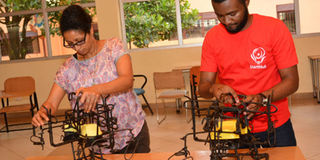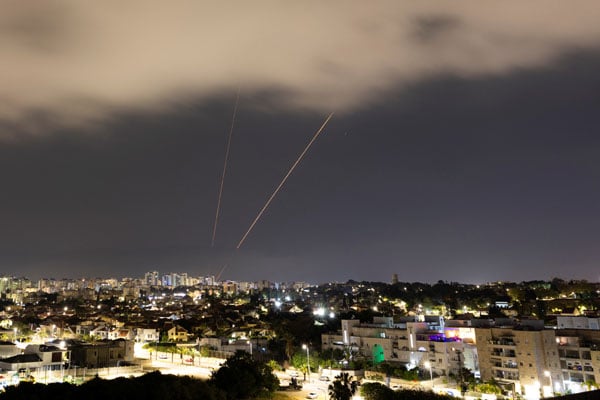The students driving innovations

Students of International University of East Africa who have developed a surveillance system
What you need to know:
- My plan is to empower other workers and to expand my project to western and northern Uganda, so that we reduce plastic waste in order to promote environmental conservation
- We have built a control module/app that is connected to a mobile app, so it can connect everywhere, plus the camera module
There has always been concern that our university students, especially those doing science-based courses cannot create anything yet some have actually made innovations. These young university innovators are moving to change the world around them, justifying the saying: “you are never too young to change the world!”
Thus driven by a passion and desire to invent, they share stories of their projects, the far they have moved, and what they figure the future to be. For those that you may have already heard about, you may henceforth put faces behind the creations.
Norbert Twizire, St. Lawrence University (sanitary pads)
I make sanitary pads and pampers using paper and banana fibres as raw materials. Other materials used are cotton cloth, lining and polythene papers. At first, I used to recycle paper while still in high school, which I picked from old books that students threw in the dustbin. During my Senior Six vacation, I was a teacher in a primary school and noticed that most female pupils went absent during menstruation as a result of lack of sanitary pads. That is how I came up with an easier way of making affordable, homemade pads.
I have been improving overtime, because the time I started, I could not use cotton or paper as an absorbent. But now, we even add polythene paper.
We are in our second year of running this project, we have not yet started packaging to the market, but we have worked with a number of women groups and non-governmental organisations who hire us to train their people about how to make these homemade sanitary pads.
Some of my future plans are seeing my project grow into a multi-billion business and expanding it into making diapers. Some of the challenges so far have been limited finances to produce in bulk or even improve technology, scarcity of paper and competition. My project has helped me meet influential people such as Charles Peter Mayiga, the Katikkiro of Buganda. We have a long way to go, but we shall reach.
Moses Mukiibi, St. Lawrence University (plastic pavers)
I make pavers from waste plastics such as plastic bottles, polythene bags, plastic tins and all other kinds of plastics. These are melted and recreated as pavers. Plastic pavers are very strong, and cannot be destroyed by water even if you used them in a waterlogged area. They are very durable, giving you a duration of 40 years in comparison to concrete pavers.
The reason I devoted my time to doing this, is because as an environmentalist who studied the effects of plastics on the environment, I started looking for new ways of recycling, reusing and reducing plastics because of its negative effects on the environment. But still, as an entrepreneur, I saw that waste plastics could be recycled to make valuable products that can be sold. I also looked at creating employment opportunities for my community.
With those in mind, I came up with recycling plastic waste into plastic pavers. Currently, I have a company called Hidden Treasure in Trash, located in Kisugu next to the Kampala Capital City Authority dumping site. We have, and make plastic pavers of different shapes such as Double T, Double S, Star and many others. I am happy that my business is growing fast and I believe I will be earning big out of it in the next few months. My plan is to empower other workers and to expand my project to western and northern Uganda, so that we reduce plastic waste in order to promote environmental conservation.
Kidan Tesfay, International University of East Africa (surveillance system)
I joined the university as a transfer student, and later when I learned about the robotics team, I was curious to join. Before I joined, I already had a clue about programming and I was willing to dedicate my time to what was taking place in the team. Specifically, I have engaged more in building/ programming the sensors, for example, the light sensor in the car surveillance system, the motion sensor, and the sound sensor. What we are remaining with is joining all these parts to the hardware, though we still have a long way to go.
Imran Kasujja, Makerere University (MakApp)
I built my first mobile application – MakApp in 2016. The App is a Makerere University map that I built basing on my experience as a fresher. I realised that an App of a map of Makerere University would help not only students but tourists and researchers as well to get themselves around the campus. It also contains a lot of information about Makerere University and can be accessible by virtue of one being in the university.
Again, as a representative on the students’ guild for the School of Business and a guild minister in charge of ICT, this was one of the stepping stones that propelled him in the world of technology as some thought it was wrong for an arts student to be appointed ICT minister.
Again, I decided to give technology a try so that I could prepare myself for the job market and also make myself relevant. That is when I started thinking of what innovation I could bring on board.
Currently, I am building an application for travellers in Kampala. It will basically look at where to find the parks, routes and destinations of particular buses and fares of different routes. Travellers will be able to use the app to book in advance and will be able to know their seat number, time of departure and arrival as well as showing traffic on different roads and offering alternatives.
Every growing economy today is highly dependent on technology, which gives innovators an opportunity to offer new solutions.
Andrew Bakashaba, International University of East Africa (robots).
We have a robotics team – which is a side activity away from the academics at IUEA. We are currently building a surveillance system.
This is a smart home surveillance system that will have multiple functions when we get done with it. It will be able to; pick up sound, take videos, see what is at a distance, will be able to detect obstacles and able to control the lighting system in a home using a timer. It will also be able to pick feedback, move for example in a compound or house and do all those functions.
As far as progress is concerned we have already built the body where the sockets will be housed, we have done the coding, - I specifically did the parking coding that detects obstacles.
We have built a control module/app that is connected to a mobile app, so it can connect everywhere, plus the camera module.
One of our short term goals is to enter inter-university competitions, although we have a long way to go. We are still working on that body to adopt to functions and implement some parts but we want to have a working prototype by the end of this semester.




